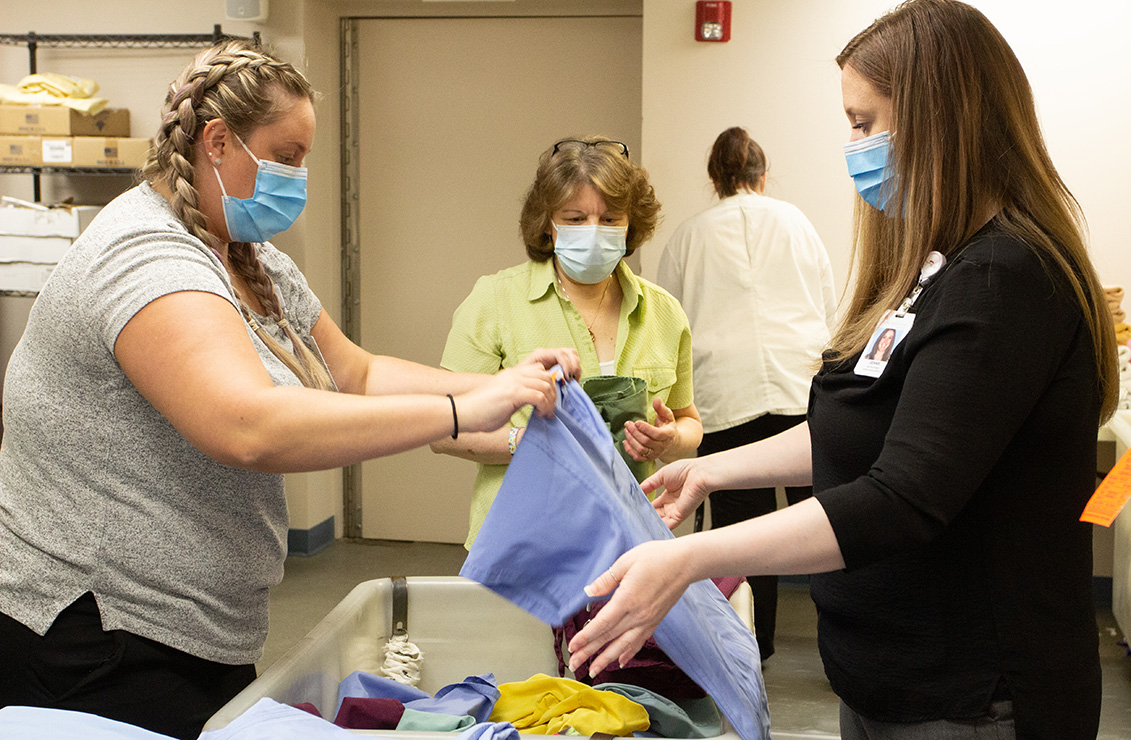Our Care Team: Working Together, Caring Together

Care team members from across Pen Bay came together to process laundry during a Linen department staff shortage in the spring.
Working Together to Manage Bed Occupancy
While the official end of the public health emergency was a welcome milestone in our COVID-19 journey, it presented some challenges, and with that, an opportunity for our teams’ resourcefulness to shine.
As part of the public health emergency, certain hospital restrictions were temporarily lifted to allow hospitals to meet the increased demands of caring for patients throughout the pandemic. When we learned in March that the emergency declaration would end May 11, care team members across Pen Bay and Waldo came together to create a plan that would ensure we were ready to once again comply with those restrictions.
The biggest challenges were found at Waldo, which is designated as a critical access hospital. Under normal circumstances, critical access hospitals must have 25 or fewer inpatients and maintain an average patient length of stay under 96 hours, or four days. During the public health emergency, beds and length of stay were unrestricted, and Waldo was operating with an average of 32 inpatients and an average length of stay of more than six days.
Nurse leaders, providers and other care team members from our emergency, surgery, intensive care and operations departments formed a work group to determine what needed to be done to meet the pre-COVID critical access hospital requirements.
“We asked, ‘what can we do to decrease our length of stay?’” said Brenda Prisco, director of utilization review and case management for Pen Bay and Waldo. “The biggest hurdle with discharging patients safely and in a timely manner is simply not having a safe place for them to go. In many cases, these patients are medically ready for discharge but need to move into a long term care facility. There just aren’t enough long term care beds available in the state to keep up with the increasing need.”
Patients awaiting placement is common at hospitals throughout the state, including Pen Bay. Knowing that many hospital beds were being filled by patients who no longer needed acute care but still needed a safe place to await placement, the teams at Pen Bay and Waldo created a transitional care unit (TCU) at Pen Bay.

Long term stay patients from both hospitals can now be moved into the TCU, which can accommodate 10 patients at a time. In the TCU, they are cared for by an interdisciplinary team – including a provider, case manager, social worker, nurses and CNAs. During their stay, patients share meals together, have access to a solarium, spend time outdoors and participate in activities such as pet therapy.
Amy Krawic, director of acute and critical care at Pen Bay, said this model has proved successful in both providing the appropriate level of patient care and helping to get patients where they need to go.
“This staffing model in the TCU provides a lot of continuity of care, which has helped us to be more effective in finding placements,” said Krawic. “We’re having success in getting patients to their end goal, which is to not be in the hospital.”
Another common barrier to discharge is lack of patient transportation. Over the past year, Pen Bay and Waldo have made significant progress in addressing this issue, including the addition of a fleet of interfacility transport ambulances and a partnership with Transport1, a Yarmouth-based wheelchair transportation service.
According to Prisco, many patients don’t drive, and finding a ride can become especially challenging for patients who use wheelchairs. Since the partnership went into effect in September, a designated transport van is parked onsite at Pen Bay and is available to provide scheduled wheelchair transports for patients at Pen Bay and Waldo from 10 am to 6 pm, Monday through Friday. This includes patients who are traveling to long term care facilities, as well as those that are returning home.
Nancy Jackson, RN, director of emergency services at Pen Bay and Waldo, said a lot of work went into making the Transport1 partnership happen. Care team members from emergency services, facilities, operations and security all worked together behind the scenes to bring the much-needed service to our hospital campuses.
“Having this service available allows us to better serve our patients,” Jackson said. “It’s an exciting and important step in providing our patients with timely transportation.”
Despite the logistical heavy lifting required to put these plans in motion in a relatively short period of time, our teams pulled together and made it happen. As a result, the teams were successful in meeting the necessary requirements when the public health emergency ended, and found ways to improve the patient experience as well.
This team approach to problem solving is what made the process so successful.
“It was really helpful that we all got together early on in the process and were able to identify potential barriers as a team,” Prisco said. “None of us could have done it alone.”
Linen Staffing Shortage: All Hands on Deck
When staffing shortages stressed Knox Center linen operations last spring, Judy Harrington, director of environmental and linen services at Pen Bay and Waldo, put out a call for help.
As laundry piled up, Pen Bay and Waldo team members rallied and volunteered multiple times per week to keep the daily cycle of towels, sheets, washcloths and gowns cleaned, folded and ready for use.
“We had care team members from EVS, security, maintenance, nursing and administration, among others, that came to help us,” Harrington said. “Without those extra hands I don’t know how we would have gotten through it.”
Harrington asked for as much help as possible in March. Her call for assistance was answered swiftly, as care team members were at the facility immediately to prepare linens for hours at a time.
A stressful situation in the beginning, ended as one of unity, with no interruption in patient services.
“It takes a team to make the village run, and this has been a prime example of team work and collaboration in action. This outpouring of support was huge and I’m very grateful for it.”
– Judy Harrington, Director of Environmental and Linen Services, Pen Bay and Waldo
Ensuring the Future of Long-Term Care for Our Community
In July, care team members at Quarry Hill and the Knox Center embodied the MaineHealth vision of working together so our communities are the healthiest in America when they successfully moved residents to the Breakwater Commons nursing care center in Rockland.
Given the increased demand for skilled- and long-term nursing care services in recent years, MaineHealth leaders began discussing ways to best meet this need in 2015. After much consideration, they formed a strategic alliance with two outside organizations with extensive experience in providing nursing care, Sandy River Company and North Country Associates. Together, they developed Breakwater Commons, a state-of-the-art facility that opened in July.
“Skilled- and long-term nursing care are of critical importance to our community,” said Loriman Looke, executive director and administrator for Quarry Hill. “The development of the new facility was key to ensuring that high quality long-term care is available in the Midcoast for years to come.”
Ensuring the smooth transition of patients to the new facility required collaboration between an interdepartmental team that included facilities, the business office, communications, activities, social work and clinical staff. Looke said he was moved by the commitment our care team members showed in preparing patients for the move, keeping everything flowing and everyone calm.
The newly-constructed 69,000-square-foot Breakwater Commons offers 96 beds for short- and long-term nursing care patients and residents. Upon opening, it welcomed nursing care residents from the Knox Center, which closed after the transition was complete, as well as from Quarry Hill, which remains open with a focus on retirement cottages, independent and assisted living apartments and its memory care unit.
MaineHealth Values
Wherever and whenever you interact with us, you can expect Pen Bay and Waldo team members to embody the MaineHealth shared values. Learn more.

